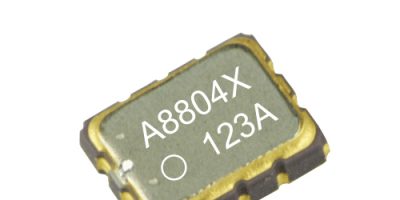Real-time clock modules consume half current of comparable modules
Modules in the RA8804CE and RX8804CE series include built-in digital temperature compensated crystal oscillators (DTCXO). The real-time clock (RTC) modules are housed in Epson’s smallest-ever RTC package, with minimum dimensions of 3.2 x 2.5 x 1.0mm.
The RA8804CE is designed for AEC-Q100-compliant automotive applications, while the RX8804CE is designed for industry systems. Both provide high-accuracy timekeeping in electronic systems while meeting the need for a small form factor and low current consumption.
Today’s industrial equipment, such as smart grid equipment, click-charge systems, security systems, are among the systems and applications which run based on time information. Accuracy is therefore essential. Accurate tracking of time and date information is also needed in equipment that is installed in vehicles, outdoors, and other environments where systems are exposed to ambient temperature extremes. There is also a growing need for RTC modules that consume less current and remain frequency-stable over a wider temperature range as integration increases but the form factor of electronic equipment reduces.
Increased accuracy tends to come at the price of higher power consumption, says Epson, making it difficult to maintain or improve the accuracy of real-time clocks, which are built by combining a crystal unit, oscillation circuit, and timekeeping IC. For the RA8804CE and RX8804CE modules, Epson has reduced the power consumption and expanded the operating temperature range by fabricating tiny, accurate tuning fork crystal units and using a new circuit design that enables the crystal unit to be driven at low power.
The new RA8804CE and RX8804CE consume 0.35-microA of current, which is 50 per cent less than the 0.7-microA consumed by the RX8900CE (an earlier equivalent Epson RTC module). The maximum operating temperature has been expanded from 85 to 105 degree C. The modules are equipped with an increased number of programmable interrupt functions, a time stamp, and 24-bit timer, all designed to lighten the load on the CPU.
Epson individually adjusts and guarantees the timekeeping accuracy of modules at the factory. This renders checking of timekeeping accuracy unnecessary and helps to increase design efficiency and quality.




